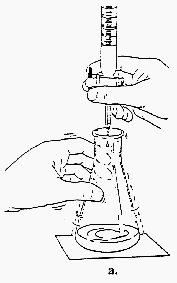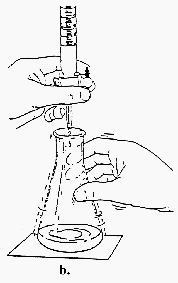


22
meniscus so that the reflection of the
colored portion of the card on the meniscus makes the
meniscus stand out more clearly.
The buret should be read to 0.02 mL. The precision is
±0.04 mL.
d)
Titration - The sample to be titrated
is usually placed in an Erlenmeyer flask (the receiving
flask). The stopcock is used to
control the rate at which the liquid in the buret, the titrant, is
added to the receiving flask. The
proper manipulation of the buret and titration flask is
illustrated below. Place your non-dominant
hand around the buret and hold the handle of
the stopcock between your fingers and
thumb. Hold the Erlenmeyer flask so that the tip of
the buret is about 1 cm into the neck.
Continuously swirl the flask with your dominant
hand
while manipulating the stopcock with your
other hand. Even though this technique may
seem awkward at first, experience has
shown it to be the most satisfactory, and with a little
practice it can become automatic.
Titration technique.
A left-handed
person should control the buret stopcock with the
right hand, swirling the flask with the
left hand. (Figure a.)
A right-handed
person should control the buret stopcock with the
left hand, swirling the flask with the
right hand. (Figure b.)
